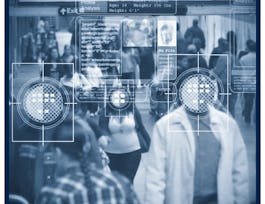The course Embarks on a transformative learning journey exploring the power of Artificial Intelligence across diverse fields such as electrical, mechanical, civil, and general applications. This course elevates the learner’s insight on AI towards the real-world practices by bridging the gap between theory and practical applications. It also provides hands-on experience of applying AI algorithms into potential applications. The examples of AI in healthcare provided in the course will enlighten the learners with an end-to-end perspective of real-world solutions. This course is crafted to introduce key AI principles required for challenging real-time applications of electrical engineering like load predictions and fault diagnosis in substations. The course also covers the application of AI in mechanical engineering, encompassing seismic data processing, geo-modelling, and reservoir engineering. The civil engineering learners will learn about AI's role in cloud data collection at construction sites and its applications in transport engineering and road traffic prediction. Immerse yourself in the future of AI with a focus on Machine and Deep learning operations, gaining insights that enable you to distinguish and apply AI based solutions to real-world challenges. Explore hands-on exercises with software support, gaining a comprehensive understanding of AI metrics. Enhance your skills and broaden your horizons with the power of AI.



Industrial Applications of AI
This course is part of Intelligent Digital Factories Specialization

Instructor: Subject Matter Expert
Sponsored by EdgePoint Software
Recommended experience
Details to know

Add to your LinkedIn profile
5 assignments
See how employees at top companies are mastering in-demand skills

Build your subject-matter expertise
- Learn new concepts from industry experts
- Gain a foundational understanding of a subject or tool
- Develop job-relevant skills with hands-on projects
- Earn a shareable career certificate


Earn a career certificate
Add this credential to your LinkedIn profile, resume, or CV
Share it on social media and in your performance review

There are 5 modules in this course
By the end of this module, learners will be able to: Understand the ML algorithms such as SVM, KNN, K-means, BERT, Random forest classifier, CNN and Mobile Net V2; Apply ML techniques in diverse real-time applications such as automated vehicle support, fraud system diagnosis, and shop floor management, neural networks for ground water quality analysis, diabetic retinopathy, image classification in IoT, forest fire detection and remotely piloted aircraft case studies
What's included
20 videos2 readings1 assignment1 discussion prompt
By the end of this module, learners will be able to: Apply ML Algorithm in various aspects of electrical engineering, such as load prediction and feature extraction in substations; Analyze the CNN based tasks related to substation analysis, infrastructure management, and infrared fault image diagnosis
What's included
22 videos1 assignment
By the end of this module, learners will be able to: Understand the impact of ML in the oil and gas industry; Interpret seismic data processing techniques, with a focus on salt body delineation using CNN; Demonstrate the process of geomodelling based on the Gaussian process regression algorithm; Examine AI applications in the upstream sector of the oil and gas industry; Infer the Service-Oriented Architecture (SOA) of big data for the oil and gas industry
What's included
18 videos1 assignment
By the end of this module, learners will be able to: Understand a generic ML modeling framework for civil engineering applications; Apply deep learning techniques in construction sites, with a focus on recycled cement strength prediction; Analyze the diverse ML application areas such as transport engineering, road traffic prediction, naval architecture, and wave height forecasting, using deep learning algorithms like ANN, CNN, and YOLO architecture
What's included
22 videos1 assignment
By the end of this module, learners will be able to: Understand the impact of AI in education; Interpret open-source AI software libraries such as H2O, ImageAI, OpenAI Gym, Keras, TensorFlow, PyTorch, and Scikit-learn; Demonstrate computer vision techniques for car object detection using YOLO; Infer the language and language reasoning in AI with an application of language identification in text; Investigate AI-based speech recognition technology in the healthcare sector for heart disease prediction; Explain policies and strategies related to AI adoption and implementation
What's included
19 videos1 assignment
Instructor

Offered by
Why people choose Coursera for their career




Recommended if you're interested in Information Technology

University of Michigan

University of Pennsylvania

Open new doors with Coursera Plus
Unlimited access to 10,000+ world-class courses, hands-on projects, and job-ready certificate programs - all included in your subscription
Advance your career with an online degree
Earn a degree from world-class universities - 100% online
Join over 3,400 global companies that choose Coursera for Business
Upskill your employees to excel in the digital economy




